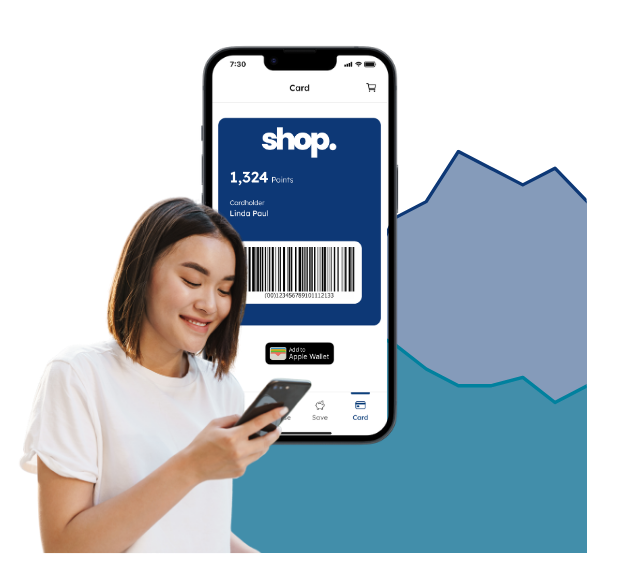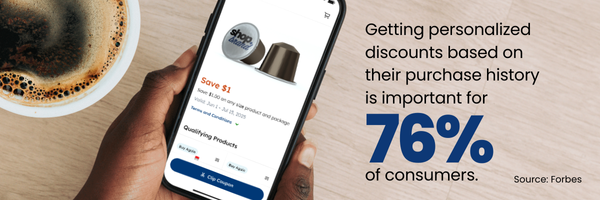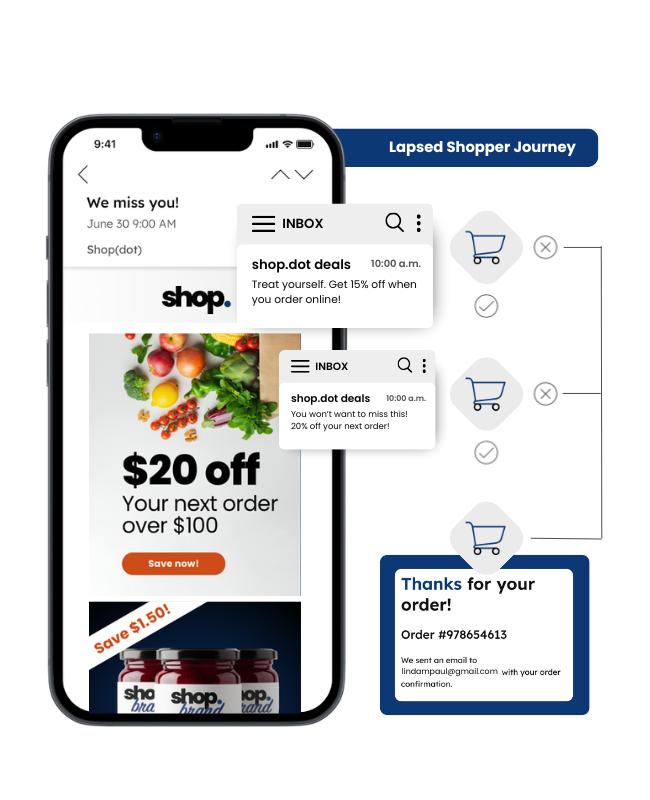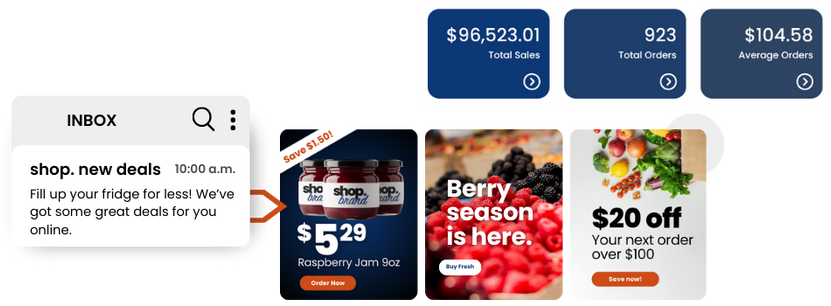In the grocery industry, many retailers currently rely on a third-party or bolt-on customer data platform (CDP) that requires custom integrations, delay time-to-value, and create data silos.
A CDP is a system that is meant to collect, unify, and activate customer data from multiple sources to support real-time marketing and engagement. When the system doesn’t perform in a streamlined way grocery personalization and retention becomes disjointed. These disconnected systems slow down execution and limit visibility across key areas like POS, eCommerce, and loyalty.
This makes it harder to personalize at scale or grow customer lifetime value effectively.
Mercatus’s DXPro solves this problem by embedding a customer data platform directly within its digital experience platform. The built-in CDP works in real time, eliminating integration delays and giving grocers instant access to predictive insights across the entire shopper journey.

This unified intelligence powers smarter digital customer engagement, improves retention, and strengthens every customer loyalty program. With DXPro, grocers can move from data collection to action—seamlessly and efficiently—while delivering experiences that increase repeat visits and drive long-term revenue.
What Is a Customer Data Platform and Why Does It Matter Today
A customer data platform (CDP) is built to unify customer data across systems and turn it into real-time, actionable insight. It connects data from POS, eCommerce, loyalty programs, and digital campaigns into one place. With this complete view, retailers can personalize customer experiences, run timely campaigns, and make decisions that drive measurable results.
In contrast to CRMs and DMPs, a customer data platform is designed for continuous, real-time engagement. While CRMs manage individual customer records for service and sales, and DMPs aggregate anonymous third-party data for advertising, a CDP uses first-party data to deliver active insights across your marketing and commerce stack. It’s built for operational use, not just reporting.
CDP, CRM & DMP: A Robust Comparison
Understanding how a customer data platform compares to other data tools is key for building a system that meets your needs. Each platform serves a different business function and supports different use cases. A CDP gives grocers direct control over their data for immediate activation, while the others operate with delays or less detail.
Here’s a breakdown of each system:
- CDP: Centralizes first-party data and makes it available in real time for marketing, loyalty, and commerce operations.
- CRM: Tracks customer interactions for sales and service teams but lacks unified engagement across platforms.
- DMP: Uses anonymized third-party data to support broad ad targeting but doesn’t support personalized communication.
Choosing a customer data platform over legacy tools supports better decision-making and faster execution across departments.
Real-Time Data Consolidation and Activation
In grocery retail, delays in campaign delivery or data updates reduce the impact of customer engagement. A CDP solves this by collecting, processing, and activating data in real time. This keeps promotions and messaging timely and relevant.
- Real-Time Activation: As shoppers browse, purchase, or engage with your store, their activity updates instantly across all connected systems.
- Unified Shopper Profiles: DXPro builds a live customer profile from every loyalty interaction, online order, and in-store transaction.
With the CDP built into the digital experience platform, there are no handoffs or slowdowns—just instant access to insight where teams already work.
Why a CDP Matters in Grocery and Retail
Grocers handle large volumes of data from multiple channels every day. Without a CDP, that data stays siloed and unused.
A customer data platform changes that by combining loyalty data, buying behavior, and campaign engagement into one actionable system.
- Better Customer Engagement: With real-time data, grocers can send more relevant promotions, recover abandoned carts, and follow up on previous purchases.
- Increased Customer Lifetime Value: By offering timely, personalized rewards and recommendations, grocers can build loyalty and encourage more frequent purchases.
When embedded in a digital experience platform, the CDP supports faster campaign launches, more accurate targeting, and better customer experiences, without adding complexity.
DXPro and AisleOne: Intelligence Built for Results
DXPro includes AisleOne, an embedded AI engine that turns real-time data into actionable insight. It sits at the core of the customer data platform, giving grocers direct access to predictive tools without extra systems or delays. AisleOne uses behavior-based signals to deliver personalized engagement, making every customer interaction more timely and relevant.
By combining the customer data platform with AisleOne, DXPro helps grocers increase conversions and build stronger loyalty. Personalization becomes a continuous process, adjusted in real time based on each shopper’s actions, preferences, and lifecycle stage.
AisleOne AI Engine Overview
AisleOne is designed specifically for retail and grocery environments. It analyzes customer behavior as it happens and produces insights grocers can use immediately. This intelligence powers campaigns, product recommendations, and loyalty triggers with greater precision.
- Real-Time Shopper Analysis: Tracks browsing, cart behavior, order history, and loyalty activity to predict future actions.
- Data-Driven Engagement: Helps grocers launch personalized campaigns based on lifecycle stage, recency, and order patterns.
This approach reduces waste in marketing and improves the accuracy of digital campaigns.
Conversion and Loyalty Through Real-Time Insight
Timing is critical in digital engagement. AisleOne supports decisions that match customer behavior in the moment, helping grocers connect when interest is highest. The results are measurable: higher conversion rates, stronger response to offers, and improved retention.
Here’s how AisleOne delivers delight:
- Triggered Offers: Sends timely, personalized deals based on recent interactions, including purchases and website activity.
- Customer Loyalty Program Integration: Uses loyalty status and point balances to customize rewards and drive deeper engagement.
This level of responsiveness strengthens your customer loyalty program while improving campaign performance.

Predictive Personalization Based on Behavior
Instead of broad segments, AisleOne focuses on individual patterns. It helps retailers deliver one-to-one personalization based on what each shopper is likely to want next. This reduces guesswork and improves ROI.
- Next-Best Offer Logic: Recommends the most relevant product or incentive based on intent and past behavior.
- Churn Risk and Lifecycle Signals: Flags changes in order frequency or engagement to guide retention strategies.
By embedding this intelligence directly into the digital experience platform, DXPro ensures the customer data platform supports action, not just analysis. This leads to more efficient campaigns and higher long-term value per customer.
What a Built-In CDP Delivers vs. Standalone Solutions
An embedded customer data platform (CDP) offers grocers a faster, more efficient way to activate customer insight without external setup or third-party delays. Unlike standalone CDPs that require weeks or months of integration work, a built-in CDP works from day one, directly within the same system used for campaigns, commerce, and customer engagement.
When the CDP is part of the digital experience platform, it unifies all data without silos or sync issues. This structure reduces technical overhead and increases campaign accuracy. Most importantly, it allows grocers to focus on increasing customer lifetime value through timely, relevant action, not data management.
No Third-Party Integrations Needed
Standalone CDPs often require custom connections to POS systems, loyalty tools, eCommerce platforms, and more. That takes time and adds risk.
DXPro’s built-in CDP avoids those challenges by working natively inside the platform you already use.
- Fewer Vendors to Manage: Since the CDP is part of the existing infrastructure, there’s no need to contract or maintain additional software providers.
- Streamlined Deployment: Data from loyalty programs, orders, and campaigns is already connected, so teams can begin using it immediately without extra development.
This makes it easier for grocers to launch personalization efforts without waiting on IT or third-party vendors.

Real-Time Engagement from Day One
With an embedded CDP, real-time activation is built into the workflow. There’s no delay between collecting data and acting on it. That timing is crucial for grocers who rely on relevance to drive sales and engagement.
- Live Customer Profiles: Every in-store transaction, online order, and loyalty interaction updates shopper profiles instantly.
- Immediate Campaign Activation: Promotions, rewards, and content can be triggered automatically based on current shopper behavior.
Grocers gain the ability to connect with customers when interest is highest, not hours or days later.
Immediate Time-to-Value and Operational Efficiency
A built-in CDP means the value starts as soon as the system goes live. Grocers don’t need to wait for long implementation periods or invest in external integrations. That efficiency supports faster results and better use of internal resources.
- Faster ROI: Campaigns begin producing results immediately through better segmentation and personalized targeting.
- Higher Efficiency: With fewer systems to manage, teams spend less time on setup and more time on strategy and execution.
These capabilities directly contribute to stronger retention and higher customer lifetime value, without adding unnecessary complexity.
Scalable Intelligence That Grows With Your Business
DXPro’s embedded intelligence is designed to adapt to retailers at every stage of growth. Whether you’re an independent grocer launching your first campaign or an enterprise expanding multi-channel operations, the platform provides real-time insights that scale with your business. It meets current needs while preparing for future complexity, without requiring new systems or disruptive upgrades.
As customer behavior changes, DXPro’s built-in AI adjusts in real time to deliver more relevant incentives, timely communications, and lifecycle-driven rewards that bolster your customer loyalty program.
By embedding personalization into the digital experience platform, DXPro supports a wide range of use cases. You can start with basic segmentation and evolve into advanced targeting strategies as your goals shift. This flexibility allows your team to grow its digital customer engagement capabilities over time without losing speed or control.
Support for Both Emerging and Enterprise Grocers
DXPro is built to serve a broad range of grocery retailers. It scales without the need for replatforming, making it ideal for businesses at different stages of digital maturity.
- Launch Without Complexity: Independent grocers can activate real-time personalization and campaigns without large IT teams.
- Grow Without Disruption: As operations expand, DXPro supports high-volume engagement across storefronts, apps, and loyalty tools.
Grocers of all sizes gain access to the same intelligent capabilities—delivered at the pace that fits their business.
Adaptive Personalization as Needs Evolve
Customer expectations shift quickly. DXPro adapts to these changes by learning from shopper behavior and updating engagement strategies automatically. This keeps your digital touchpoints aligned with current preferences.
- Behavior-Based Adjustments: The platform updates promotions, product suggestions, and timing based on customer activity.
- Lifecycle-Driven Campaigns: Engagement tactics shift as customers move from onboarding to active usage or loyalty stages.
This ensures that digital customer engagement remains timely, effective, and relevant at every step.
Continuous Enhancement of the Customer Loyalty Program
Loyalty programs are most effective when they stay relevant. DXPro strengthens your customer loyalty program by connecting it directly to real-time insights and engagement triggers.
- Personalized Loyalty Offers: Rewards and pricing are adjusted dynamically based on order frequency, spend levels, and preferences.
- Real-Time Incentive Delivery: Loyalty rewards are served automatically during shopping and checkout, both online and in-store.
As the program grows, DXPro supports more sophisticated loyalty strategies, ensuring long-term value for both customers and retailers.
Conclusion
A built-in customer data platform gives grocers the ability to act on insight the moment it matters. By combining real-time intelligence with embedded personalization tools, DXPro allows retailers to deliver more relevant offers, improve retention, and drive measurable gains in revenue. With unified data powering engagement, every promotion, message, and interaction supports stronger customer relationships and long-term growth.
DXPro is more than just software—it’s a system that turns your data into action without delay or added complexity. Whether you’re focused on personalizing offers, strengthening your customer loyalty program, or improving day-to-day operations, the platform is built to scale with your needs.
Ready to see what embedded intelligence can do for your business? Book a demo today and experience the difference of a purpose-built customer data platform.
Frequently Asked Questions
What is a customer data platform (CDP)?
A customer data platform is a system that collects and unifies first-party customer data from multiple sources, such as POS, eCommerce, and loyalty programs. It creates real-time, centralized profiles used to drive personalized marketing, campaign automation, and better customer experiences.
How does a CDP work?
A CDP works by ingesting data from various channels, cleaning and organizing it into unified customer profiles, and activating that data for real-time engagement. When embedded in a digital experience platform, it allows grocers to immediately use these insights across campaigns, storefronts, and loyalty efforts without custom integrations.
What are the benefits of a customer data platform?
A customer data platform improves targeting, speeds up personalization, and helps increase customer lifetime value by making data actionable in real time. It also enables stronger customer retention, better segmentation, and more efficient digital engagement—all without adding operational complexity.
Is a CDP the same as a CRM?
No, a CDP is different from a CRM. While CRMs store individual customer interactions for sales or support teams, a customer data platform consolidates data from all systems and activates it for marketing and personalization. CDPs are designed for real-time engagement across digital channels.
Who should use a customer data platform?
Retailers, especially grocers, who want to improve digital customer engagement, loyalty, and personalization should use a CDP. It’s useful for businesses of any size looking to reduce data silos, streamline campaigns, and grow long-term value from their customer base.
How does a CDP ensure data privacy and compliance?
A CDP includes tools to manage consent, access controls, and data governance, ensuring that customer information is handled according to privacy laws like GDPR and CCPA. Platforms like DXPro give retailers full control over their data, helping them stay compliant while personalizing responsibly.
Can a CDP integrate with other marketing tools?
Yes, most CDPs are built to work with other systems, and embedded solutions like DXPro eliminate the need for custom integrations. They connect directly with loyalty systems, email platforms, eCommerce tools, and more to power seamless, cross-channel engagement.



